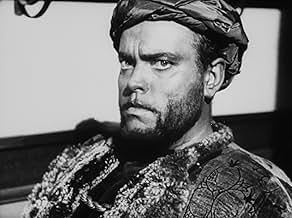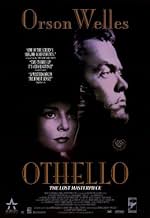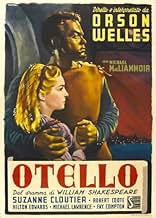IMDb RATING
7.5/10
10K
YOUR RATING
The Moorish General Othello is manipulated into thinking that his new wife Desdemona has been carrying on an affair with his Lieutenant Michael Cassio when in reality, it is all part of the ... Read allThe Moorish General Othello is manipulated into thinking that his new wife Desdemona has been carrying on an affair with his Lieutenant Michael Cassio when in reality, it is all part of the scheme of a bitter Ensign named Iago.The Moorish General Othello is manipulated into thinking that his new wife Desdemona has been carrying on an affair with his Lieutenant Michael Cassio when in reality, it is all part of the scheme of a bitter Ensign named Iago.
- Director
- Writers
- Stars
- Awards
- 1 win & 1 nomination total
Jean Davis
- Montano
- (uncredited)
Abdullah Ben Mohamet
- Pageboy
- (uncredited)
Joseph Cotten
- Senator
- (uncredited)
Joan Fontaine
- Page
- (uncredited)
Robert Rietty
- Lodovico
- (voice)
- (uncredited)
Gudrun Ure
- Desdemona
- (voice)
- (uncredited)
- Director
- Writers
- All cast & crew
- Production, box office & more at IMDbPro
7.510K
1
2
3
4
5
6
7
8
9
10
Featured reviews
Dimensional Filmmaking
Commenting on Shakespeare films is rather like admiring Easter Eggs.
First the inside: this was never a great play, relative to Shakespeare's other works. His great plays are about ideas, with characters as vectors to prod and activate them. This play is merely about characters, which makes it attractive to actors. That's certainly why Welles selected it.
Welles is the Sinatra of dramatic reading, with phrasing mastered in his radio days. All else is acceptable (at least to my tastes) so far as the play goes.
Now the shell, and here is what makes this film one of the most important. When Welles moved into film, he did so as an architect. He understood that great film constructs a space that includes the audience. So he worked with the most direct tools, buildings themselves. These sets are remarkable. I cannot imagine how he found them, how he could have seen the possibilities.
Selection aside, how he uses the spaces! View this film at least once in silence. I rate Welles as one of the 20th century's great architects and predict that this film will be mined when we get around to really creating cyberbuilding.
First the inside: this was never a great play, relative to Shakespeare's other works. His great plays are about ideas, with characters as vectors to prod and activate them. This play is merely about characters, which makes it attractive to actors. That's certainly why Welles selected it.
Welles is the Sinatra of dramatic reading, with phrasing mastered in his radio days. All else is acceptable (at least to my tastes) so far as the play goes.
Now the shell, and here is what makes this film one of the most important. When Welles moved into film, he did so as an architect. He understood that great film constructs a space that includes the audience. So he worked with the most direct tools, buildings themselves. These sets are remarkable. I cannot imagine how he found them, how he could have seen the possibilities.
Selection aside, how he uses the spaces! View this film at least once in silence. I rate Welles as one of the 20th century's great architects and predict that this film will be mined when we get around to really creating cyberbuilding.
Great cinematography, a tragic but flawed story
Right from the start, Othello has a striking visual style. Oblique camera angles (from low and high, close and far), nice use of shadows, a cool-looking castle. Really nice black-and-white imagery to look at.
On the other hand, I wasn't as convinced by the story and acting (but they grew on me as the film continued). There are many parts where actors seem to rush or mumble their lines. Shakespeare is hard enough to follow and a good performance should draw you in and make the dialogue *easier* to understand. Characters are often facing away so we hear their lines but can't see their mouths or their facial expressions. What's the point of acting then? I can act if acting means reciting lines from a Shakespearean play.
I have since learned that Welles was struggling with funds for the movie and that explains some of its short-comings. Especially with sound. He had to dub some of the lines himself and there remain parts which are clearly out of sync. It's hilarious to learn that he borrowed/took costumes from another movie to use on Othello. And that costumes weren't ready for one scene so he changed the location to a bathhouse with the actors in towels.
I find the story flawed. Iago is single-handedly able to manipulate Othello to his will. Iago is unlikable because of his misanthropy but Othello may be even more unlikable in his stupidity. He never thinks to properly analyse or question what Iago presents to him as the truth. He barely seems to communicate with his wife at all and becomes consumed by his obsessions and assumptions. But I do somewhat admire Iago's patience and intelligence, he makes a good villain. And there is real tragedy to what happens. It's conceivable that some unfortunate coincidences could help a seed of suspicion grow into the full-hearted conviction that you're being lied to. And to desire revenge is all too human. It's just funny that nobody suspects Iago. Othello would prefer to believe that everyone else is against him.
I found the ending climactic and meaningful. Some of it took me by surprise, other parts felt inevitable. I'm aware that Welles shortened the play a lot and may have taken liberties with it. At least I now have a rough idea of what Othello is about; I feel more educated. I liked all of the actors but Micheál MacLiammóir (a Dublin actor in his only feature film role) stands out as the antagonist. There's something about his eyes and calm indifference. Less is more.
Summarising, Othello is rewarding for its villain, its believable tragic turn of events and the enjoyable, creative cinematography. Now if only Othello could learn the scientific method...
On the other hand, I wasn't as convinced by the story and acting (but they grew on me as the film continued). There are many parts where actors seem to rush or mumble their lines. Shakespeare is hard enough to follow and a good performance should draw you in and make the dialogue *easier* to understand. Characters are often facing away so we hear their lines but can't see their mouths or their facial expressions. What's the point of acting then? I can act if acting means reciting lines from a Shakespearean play.
I have since learned that Welles was struggling with funds for the movie and that explains some of its short-comings. Especially with sound. He had to dub some of the lines himself and there remain parts which are clearly out of sync. It's hilarious to learn that he borrowed/took costumes from another movie to use on Othello. And that costumes weren't ready for one scene so he changed the location to a bathhouse with the actors in towels.
I find the story flawed. Iago is single-handedly able to manipulate Othello to his will. Iago is unlikable because of his misanthropy but Othello may be even more unlikable in his stupidity. He never thinks to properly analyse or question what Iago presents to him as the truth. He barely seems to communicate with his wife at all and becomes consumed by his obsessions and assumptions. But I do somewhat admire Iago's patience and intelligence, he makes a good villain. And there is real tragedy to what happens. It's conceivable that some unfortunate coincidences could help a seed of suspicion grow into the full-hearted conviction that you're being lied to. And to desire revenge is all too human. It's just funny that nobody suspects Iago. Othello would prefer to believe that everyone else is against him.
I found the ending climactic and meaningful. Some of it took me by surprise, other parts felt inevitable. I'm aware that Welles shortened the play a lot and may have taken liberties with it. At least I now have a rough idea of what Othello is about; I feel more educated. I liked all of the actors but Micheál MacLiammóir (a Dublin actor in his only feature film role) stands out as the antagonist. There's something about his eyes and calm indifference. Less is more.
Summarising, Othello is rewarding for its villain, its believable tragic turn of events and the enjoyable, creative cinematography. Now if only Othello could learn the scientific method...
Great movie from Welles
I've always been an admirer of Welles movies, starting with citizen Kane and the other masterpieces. Considering Othello, I highly admired this movie since the first shot, when the face of the dead Othello appears suddenly in the dark, and then the other details begin to appear, revealing the awesome funeral of both Othello and his murdered wife. In fact the best thing about this movie is the synchronization of the camera movement and angles with the state of mind and moods of characters especially that of Othello. Sometimes we are actually looking at the world through Othello's mind, the images are bizarre and grotesque, this is accompanies by wonderful acting of the cast. For any Welles fan this is a must see, considering the beauty of picture and creativity of interpretation. It's a pity that Welles didn't have a sufficient financial support to surpass some technical problems although the final effect and meaning of this masterpiece is not affected at all!
Welles' indomitable spirit in the face of penury shines in yet another Wellesian Masterpiece
THE TRAGEDY OF OTHELLO: THE MOOR OF VENICE/ US/France/Italy/Morocco 1952 (3.5 STARS)
The recent restoration of Othello brings to cinematic space the magic of another masterpiece from Orson Welles. To think that a whole master negative of this film (which won the Best film at Cannes in 1952) was lying abandoned in a New Jersey warehouse, was discovered by accident and is the reason for this print that we now have access to, is enough to send shivers down the spine of any Welles-phile. . Mise-en-scene: Like with many of his other works involving especially Shakespeare, be prepared for Welles' licenses and personal interpretation of subject matter pertaining to Othello. Yet at the end, we are left with a feeling of deep tragedy and loss for Othello, played by Welles himself, and though we feel that Othello was quite an idiot, we at least feel that he was a very unfortunate idiot at that! . The problem may have been that the critical scene where Iago poisons Othello's mind and fuels his suspicion is scrappy and left unexplored. This may well have had little to do with Welles' artistic choices, and more with his monetary situation at the time. Welles' penury through his European sojourn is widely known and the passion with which he would invest into his films, every penny earned through moonlighting his booming voice and above-average acting skills is legendary, and should put this in context.
. The figure behavior of Micheál MacLiammóir is utterly convincing as the detestable Iago who is consumed by jealousy and rage at being overlooked as the second-in-command. But the person to steal our hearts is Suzanne Cloutier who portrays the fair-dame Desdemona. She is every bit as dainty as we would have imagined her to be. . The stripped down set design works wonderfully for the film and even though budgets may have been the driving force, Othello's barren palace is preceded only by the barrenness of his blinding jealousy and irrational actions. . Cinematography: As we have come to expect, Orson Welles has a unique cinematic language, through which he creates a Wellesian world of skin-burning close ups, dutched crazy world-frames and low angle shots to create a tense atmosphere of foreboding. But there is no better example of exploring and using frame depth than in Othello. Time and again Welles plays with foreground element to reveal psychologically subjective and meta-diagetic moods while cleverly using the depth in the frame to forward the narrative and plot the next progression. The title shots of the film are harrowing in their effect, with the interplay of high-contrast earth and sky contours that at once establish the mood for an intense cinematic experience. . Sound & Editing: The restored version has a brand-new soundtrack mentored by Welles' daughter, and while it enhances the experience to telling effect, it is irony to note that just the new soundtrack cost much more than what Welles assembled the whole film for. The fact that parts of the film were shot MOS and other parts used ADR is distracting due to the obvious lack of lip-sync, but in the final analysis, we watch Welles with reverence almost as if on a visit to Sunday Mass, paying homage, never once forgetting that were are witness to a filmmaker stripped of resources, devoid of many essential tools, but one with indomitable spirit who refused to be cowed-down. Othello is magical in its story telling and another worthy showcase of the genius of Orson Welles.
The recent restoration of Othello brings to cinematic space the magic of another masterpiece from Orson Welles. To think that a whole master negative of this film (which won the Best film at Cannes in 1952) was lying abandoned in a New Jersey warehouse, was discovered by accident and is the reason for this print that we now have access to, is enough to send shivers down the spine of any Welles-phile. . Mise-en-scene: Like with many of his other works involving especially Shakespeare, be prepared for Welles' licenses and personal interpretation of subject matter pertaining to Othello. Yet at the end, we are left with a feeling of deep tragedy and loss for Othello, played by Welles himself, and though we feel that Othello was quite an idiot, we at least feel that he was a very unfortunate idiot at that! . The problem may have been that the critical scene where Iago poisons Othello's mind and fuels his suspicion is scrappy and left unexplored. This may well have had little to do with Welles' artistic choices, and more with his monetary situation at the time. Welles' penury through his European sojourn is widely known and the passion with which he would invest into his films, every penny earned through moonlighting his booming voice and above-average acting skills is legendary, and should put this in context.
. The figure behavior of Micheál MacLiammóir is utterly convincing as the detestable Iago who is consumed by jealousy and rage at being overlooked as the second-in-command. But the person to steal our hearts is Suzanne Cloutier who portrays the fair-dame Desdemona. She is every bit as dainty as we would have imagined her to be. . The stripped down set design works wonderfully for the film and even though budgets may have been the driving force, Othello's barren palace is preceded only by the barrenness of his blinding jealousy and irrational actions. . Cinematography: As we have come to expect, Orson Welles has a unique cinematic language, through which he creates a Wellesian world of skin-burning close ups, dutched crazy world-frames and low angle shots to create a tense atmosphere of foreboding. But there is no better example of exploring and using frame depth than in Othello. Time and again Welles plays with foreground element to reveal psychologically subjective and meta-diagetic moods while cleverly using the depth in the frame to forward the narrative and plot the next progression. The title shots of the film are harrowing in their effect, with the interplay of high-contrast earth and sky contours that at once establish the mood for an intense cinematic experience. . Sound & Editing: The restored version has a brand-new soundtrack mentored by Welles' daughter, and while it enhances the experience to telling effect, it is irony to note that just the new soundtrack cost much more than what Welles assembled the whole film for. The fact that parts of the film were shot MOS and other parts used ADR is distracting due to the obvious lack of lip-sync, but in the final analysis, we watch Welles with reverence almost as if on a visit to Sunday Mass, paying homage, never once forgetting that were are witness to a filmmaker stripped of resources, devoid of many essential tools, but one with indomitable spirit who refused to be cowed-down. Othello is magical in its story telling and another worthy showcase of the genius of Orson Welles.
One of the great Shakespeare films.
I must be one of the few who saw this film (more than once!) before it vanished in the 60's. I saw it on TV in the last 50's, and later brought it to the small college where I was teaching 63-65. Though heavily cut and more than a little rearranged, it is one of the very finest of Shakespeare films. Performances are generally excellent and unified in style and diction. Welles, or course, is magnificent. Anyone who thinks he was never anything but a self-parodying ham has not seen this film. One could wish than MacLiammoir had had more overt FUN as Iago, who does what he does, in part at least, in an attempt to stimulate himself out of his blunted affect. The film also has some of the finest black-and-white cinematography of all time, and uses architecture in a unique and effective way.
Did you know
- TriviaWhen he made The Black Rose (1950), Orson Welles insisted that the coat his character wore be lined with mink, even though the lining would never be visible in the finished film. The producers acquiesced to this demand. When the shoot was over, the coat disappeared. In "Othello", Orson Welles can be seen wearing the same coat, complete with mink lining.
- Alternate versionsThis film by Orson Welles, was 'restored' by a group in Chicago in 1991/2. The film was transferred to, and enhanced in video, (D1 format) retaining it as black and white. The audio was completely rebuilt, including the score, in Stereo Surround. All dialogue, however was original. This was a problem as some of the dialogue was distorted and unintelligible. John Fogelson, editor, was a major supervisor of the project. Ed Golya, Lorita DeLacerna, and Steve Wilke, were digital editors. And Ed Golya remixed the soundtrack. The process took 9 months. It was purchased for distribution by Castle Hill, and taken to New York where it went through another transformation before release. The restoration engineer in New York, Paul Michael, restored the audio that was supplied on 35mm optical negatives. He was able to remove the distortion, optical pops and surface noise that is inherent with Optical negatives. The restored audio was then sent to Sound One for the final mix. Unintelligible dialogue was replaced with 'sound-alikes'. This decision was made for the entertainment value of the film. The original mono music was then reintroduced into the final product. Basically, the film was retransferred, and the rebuilt sound effects tracks were added. This was done at Sound One, in NYC.. The credits were adjusted to place Lee Dickter (sp?) as Re-recording Mixer, and Ed Golya as Sound Effects Editor.
- ConnectionsEdited into Histoire(s) du cinéma: La monnaie de l'absolu (1999)
- How long is Othello?Powered by Alexa
Details
- Release date
- Countries of origin
- Official sites
- Languages
- Also known as
- Orson Welles' Othello
- Filming locations
- Castle, El Jadida, Morocco(cistern interior)
- Production companies
- See more company credits at IMDbPro
Box office
- Gross US & Canada
- $28,980
- Opening weekend US & Canada
- $6,010
- Apr 27, 2014
- Gross worldwide
- $28,980
- Runtime
- 1h 30m(90 min)
- Color
- Aspect ratio
- 1.37 : 1
Contribute to this page
Suggest an edit or add missing content









































